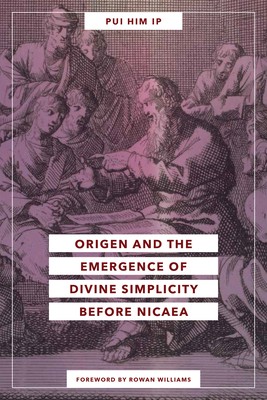
- We will send in 10–14 business days.
- Author: Pui Him Ip
- Publisher: University of Notre Dame Press
- ISBN-10: 026820361X
- ISBN-13: 9780268203610
- Format: 15.2 x 22.9 x 1.8 cm, kieti viršeliai
- Language: English
- SAVE -10% with code: EXTRA
Origen and the Emergence of Divine Simplicity Before Nicaea (e-book) (used book) | bookbook.eu
Reviews
Description
This book establishes how the doctrine of divine simplicity was interwoven with the formation of a Christian Trinitarian understanding of God before Nicaea.
For centuries, Christian theology affirmed God as simple (haplous) and Triune. But the doctrine of the simple Trinity has been challenged by modern critics of classical theism. How can God, conceived as purely one without multiplicity, be a Trinity? This book sets a new historical foundation for addressing this question by tracing how divine simplicity emerged as a key notion in early Christianity. Pui Him Ip argues that only in light of the Platonic synthesis between the Good and the First Principle (archē) can we make sense of divine simplicity as a refusal to associate any kind of plurality that brings about contraries in the divine life. This philosophical doctrine, according to Ip, was integral to how early Christians began to speak of the divine life in terms of a relationship between Father and Son.
Through detailed historical exploration of Irenaeus, sources from the Monarchian controversy, and especially Origen's oeuvre, Ip contends that the key contribution from ante-Nicene theology is the realization that it is nontrivial to speak of the begetting of a distinct person (Son) from a simple source (Father). This question became the central problematic in Trinitarian theology before Nicaea and remained crucial for understanding the emergence of rival accounts of the Trinity ("pro-Nicene" and "anti-Nicene" theologies) in the fourth century. Origen and the Emergence of Divine Simplicity before Nicaea suggests a new revisional historiography of theological developments after Origen and will be necessary reading for serious students both of patristics and of the wider history of Christian thought.
EXTRA 10 % discount with code: EXTRA
The promotion ends in 21d.22:09:32
The discount code is valid when purchasing from 10 €. Discounts do not stack.
- Author: Pui Him Ip
- Publisher: University of Notre Dame Press
- ISBN-10: 026820361X
- ISBN-13: 9780268203610
- Format: 15.2 x 22.9 x 1.8 cm, kieti viršeliai
- Language: English English
This book establishes how the doctrine of divine simplicity was interwoven with the formation of a Christian Trinitarian understanding of God before Nicaea.
For centuries, Christian theology affirmed God as simple (haplous) and Triune. But the doctrine of the simple Trinity has been challenged by modern critics of classical theism. How can God, conceived as purely one without multiplicity, be a Trinity? This book sets a new historical foundation for addressing this question by tracing how divine simplicity emerged as a key notion in early Christianity. Pui Him Ip argues that only in light of the Platonic synthesis between the Good and the First Principle (archē) can we make sense of divine simplicity as a refusal to associate any kind of plurality that brings about contraries in the divine life. This philosophical doctrine, according to Ip, was integral to how early Christians began to speak of the divine life in terms of a relationship between Father and Son.
Through detailed historical exploration of Irenaeus, sources from the Monarchian controversy, and especially Origen's oeuvre, Ip contends that the key contribution from ante-Nicene theology is the realization that it is nontrivial to speak of the begetting of a distinct person (Son) from a simple source (Father). This question became the central problematic in Trinitarian theology before Nicaea and remained crucial for understanding the emergence of rival accounts of the Trinity ("pro-Nicene" and "anti-Nicene" theologies) in the fourth century. Origen and the Emergence of Divine Simplicity before Nicaea suggests a new revisional historiography of theological developments after Origen and will be necessary reading for serious students both of patristics and of the wider history of Christian thought.


Reviews